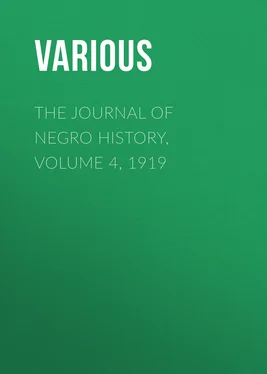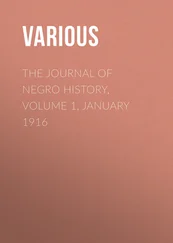Various - The Journal of Negro History, Volume 4, 1919
Здесь есть возможность читать онлайн «Various - The Journal of Negro History, Volume 4, 1919» — ознакомительный отрывок электронной книги совершенно бесплатно, а после прочтения отрывка купить полную версию. В некоторых случаях можно слушать аудио, скачать через торрент в формате fb2 и присутствует краткое содержание. Жанр: foreign_antique, periodic, История, foreign_edu, на английском языке. Описание произведения, (предисловие) а так же отзывы посетителей доступны на портале библиотеки ЛибКат.
- Название:The Journal of Negro History, Volume 4, 1919
- Автор:
- Жанр:
- Год:неизвестен
- ISBN:нет данных
- Рейтинг книги:5 / 5. Голосов: 1
-
Избранное:Добавить в избранное
- Отзывы:
-
Ваша оценка:
- 100
- 1
- 2
- 3
- 4
- 5
The Journal of Negro History, Volume 4, 1919: краткое содержание, описание и аннотация
Предлагаем к чтению аннотацию, описание, краткое содержание или предисловие (зависит от того, что написал сам автор книги «The Journal of Negro History, Volume 4, 1919»). Если вы не нашли необходимую информацию о книге — напишите в комментариях, мы постараемся отыскать её.
The Journal of Negro History, Volume 4, 1919 — читать онлайн ознакомительный отрывок
Ниже представлен текст книги, разбитый по страницам. Система сохранения места последней прочитанной страницы, позволяет с удобством читать онлайн бесплатно книгу «The Journal of Negro History, Volume 4, 1919», без необходимости каждый раз заново искать на чём Вы остановились. Поставьте закладку, и сможете в любой момент перейти на страницу, на которой закончили чтение.
Интервал:
Закладка:
It was not long before political excitement disturbed the harmony between the pastor and the people in West Rutland. On certain occasions Haynes was treated with unkindness and even with abuse by unprincipled men. Scandalous reports concerning him were circulated and he was denounced with profane language. But he gloried in tribulations, knowing that "tribulations worketh patience and patience experience and experience hope and hope maketh not ashamed." Observing the signs of the times, therefore, and governed by prayerful deliberation he felt that he should sever his connection with his church in Rutland. Accordingly, on the 27th of April, 1818, at a council convened to consider the serious question the pastoral relation was by mutual consent dissolved.
Haynes was then invited to preach in Manchester, Vermont, a desirable town west of the Green Mountains. Because of his reputation as a preacher here Haynes had the helpful contact of the Honorable Richard Skinner, who in early life was elected a member of Congress and afterwards served as a judge of the Supreme Court and finally as Governor of Vermont. He associated also with Joseph Burr, the liberal benefactor of several literary and religious institutions.
In 1822 Haynes removed from Manchester to Granville, New York. He had enjoyed the support of the best people in that New England community and had usually found them a generous and enlightened people. Under his ministration at Manchester the church was much enlarged, but he was now declining in intellectual vivacity and realized that, although there was entire harmony between him and the people in Manchester, they should have a younger man. His church accordingly yielded to the desire of the Congregational Church in Granville, New York, and he took leave of Vermont to preach in another State.
In going to Granville, Haynes connected with the renowned Deacon Elihu Atkins, of Granville, with whom he had corresponded for more than thirty years. There had been a cherished intimacy between them from their youth. Atkins had for years relied upon the convincing instruction which he endeavored to obtain through correspondence with Haynes. These letters show the tenderness and the watchfulness of a pastor over a flock, which reminds one of the relation existing between Paul and the aged Philemon. During the eleven years which he spent at Granville, his congregation was decidedly edified. Thousands of persons giving evidence of their piety, joined the church and lived above reproach. While laboring among these people he died in the year 1833.
Thus passed away the man who was regarded by those who knew him as a worker of unusual ability and a preacher of power. Says his biographer: "Although the tincture of his skin, and all his features bore strong indications of his paternal original, yet in his early life there was a peculiar expression which indicated the finest qualities of mind. Many, on seeing him in the pulpit, have been reminded of the inspired expression, 'I am black, but comely.' In his case the remarkable assemblage of grace which was thrown around his semi-African complexion, especially his eye, could not fail to prepossess the stranger in his favor." 46 46 Cooley, Sketches of the Life and Character of the Rev. Lemuel Haynes , pp. 372-373.
He was a man of a feeling heart, always sensibly affected at the sight of human suffering. His sensibility knew no bounds. He exhibited quickness of perception and had the advantage of a never-failing memory. The confidence generally reposed in him by both ministers and the people credit him with having mature judgment. Although lacking in what is commonly known as classical education, as he never penetrated very far into the Greek and Latin classics, his mind was decidedly literary. He read the Latin language fairly well but had never read more than the Greek testament and Septuagint. He was well read, however, in the English classics and his discourses show taste for the beauties of poetry and elegant composition.
Haynes was always industrious, his early habits having been formed in the rigid pursuits of business. At home he was a man of the highest domestic virtue. His family government was strictly parental, based on reason and principle, not on passion or blind indulgence. He was always strict, ever adhering to a standard of the most Puritanic order. Having early formed the high ideals of uprightness, no man could ever bring against him the charge of dishonesty. Above all he was a man of consistent piety and resignation to the will of God.
His dying testimony was: "I love my wife, I love my children, but I love my Saviour better than all." A plain marble marks his grave. On it is this inscription, prepared by himself:
"Here lies the dust of a poor hell-deserving sinner, who ventured into eternity trusting wholly on the merits of Christ for salvation. In the full belief of the great doctrines he preached while on earth, he invites his children and all who read this, to trust their eternal interest on the same foundation."
So lived and died one of the noblest of the New England Congregational ministers of a century ago. Of illegitimate birth, and of no advantageous circumstances of family, rank or station, he became one of the choicest instruments of Christ. His face betrayed his race and blood, and his life revealed his Lord.
W. H. Morse.Hartford, Conn.
THE ANTI-SLAVERY SOCIETY OF CANADA
The Anti-Slavery Society of Canada was one of the forms in which the abolition sentiment of the province of Upper Canada made its contribution to the final settlement of the great issue in the neighboring country. Though founded comparatively late in the struggle, it was, after all, rather the union of forces long active than the creation of some new weapon to aid the battle. The men and women who composed its membership were abolitionists long before the society was founded. Its purpose was solely to bring united effort to bear upon the great task and the great responsibility that fell upon Canada when the passing of the Fugitive Slave Bill drove the Negroes from the North into Canada by the hundreds, if not by the thousands. With newcomers arriving every day, destitute, friendless and more or less dazed by the experiences through which they had passed, it was no small task that these Canadian abolitionists had undertaken to care for the fugitives, give them opportunities for education and social advancement and enable them to show by their own efforts that they were capable of becoming useful citizens.
The society had its birth in Toronto in February, 1851. There had been attempts before this to found such an organization but they had come to nothing. By 1851, however, the situation in the United States had changed and the effect had at once shown itself in Canada, so that the time was ripe for the bringing into one body of the various individuals who had been showing themselves the friends of the slave. The Society of Canada continued active right through the fifties and early sixties, not resting until the aim for which it had been founded had been accomplished. With the close of the Civil War there was a large emigration of Negroes back to their own land where their freedom had been bought in blood, and the need of any large organization to look after their welfare as a race gradually ceased. During its period of active work, however, the society spread out from Toronto to all the larger cities and towns where there was a Negro population, and in both educational and relief work showed itself an energetic body. Included in its active membership were some of the best-known men in the province and as its organ it had an outstanding newspaper, The Globe , of Toronto.
The meeting held in Toronto was large and enthusiastic. The Globe of Toronto of March 1, gives almost five columns to the report of the proceedings. The mayor of the city acted as chairman and the opening prayer was made by Rev. Dr. Michael Willis, the principal of Knox Presbyterian Theological College. A series of four resolutions were proposed and endorsed. The first of these declared as a platform of the society that "slavery is an outrage on the laws of humanity" and that "its continued practice demands the best exertions for its extinction." A second resolution, proposed by Dr. Willis, declared the United States slave laws "at open variance with the best interests of man, as endowed by our great creator with the privilege of life, liberty and the pursuit of happiness." A third resolution expressed sympathy with the abolitionists in the United States, while the fourth and concluding resolution proposed the formation of the Anti-Slavery Society of Canada. "The object," it declared, "shall be to aid in the extinction of slavery all over the world by means exclusively lawful and peaceable, moral and religious, such as by the diffusing of useful information and argument, by tracts, newspapers, lectures and correspondence, and by manifesting sympathy with the houseless and homeless victims of slavery flying to our soil."
Читать дальшеИнтервал:
Закладка:
Похожие книги на «The Journal of Negro History, Volume 4, 1919»
Представляем Вашему вниманию похожие книги на «The Journal of Negro History, Volume 4, 1919» списком для выбора. Мы отобрали схожую по названию и смыслу литературу в надежде предоставить читателям больше вариантов отыскать новые, интересные, ещё непрочитанные произведения.
Обсуждение, отзывы о книге «The Journal of Negro History, Volume 4, 1919» и просто собственные мнения читателей. Оставьте ваши комментарии, напишите, что Вы думаете о произведении, его смысле или главных героях. Укажите что конкретно понравилось, а что нет, и почему Вы так считаете.












